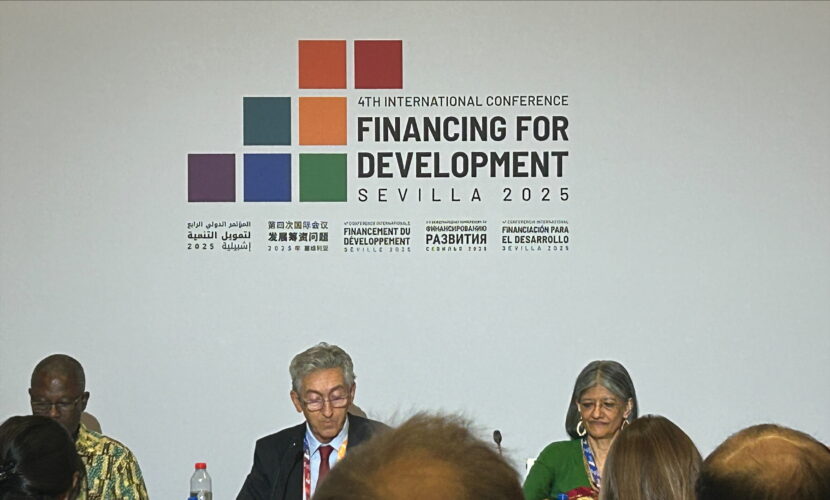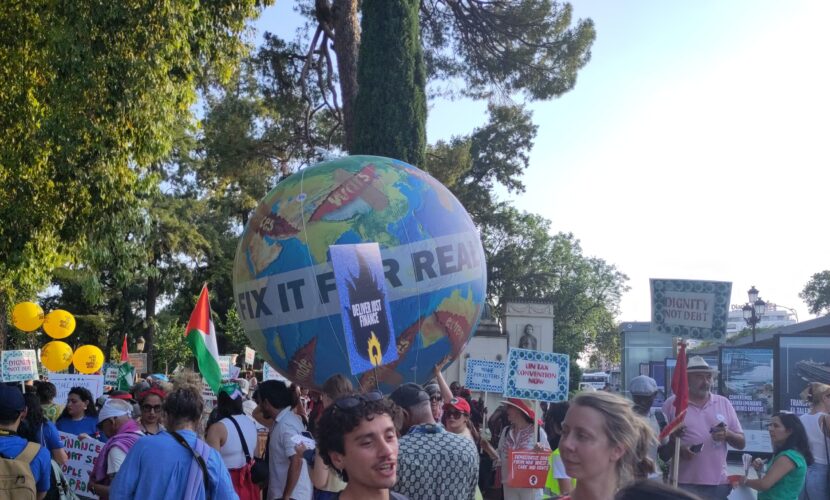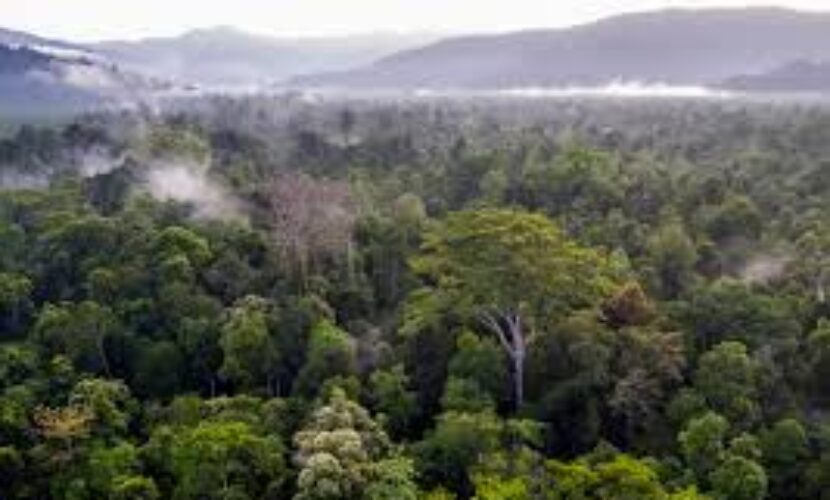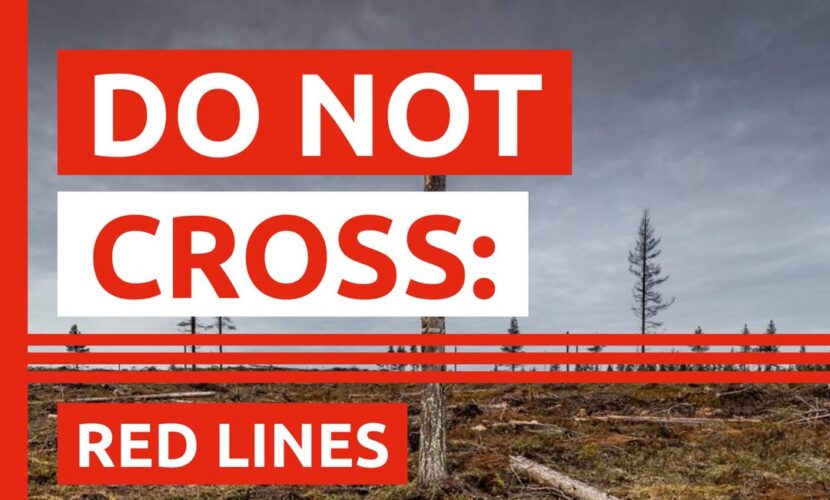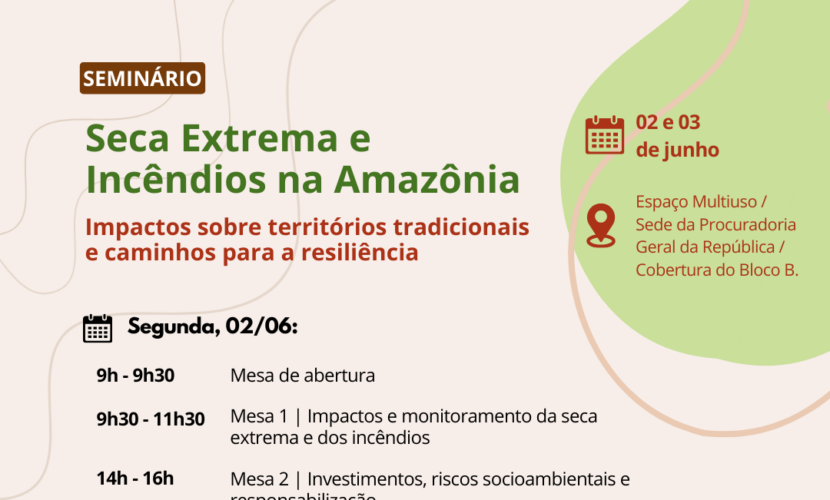News
Final TNFD Framework Launching September 18th: Rainforest Action Network Response
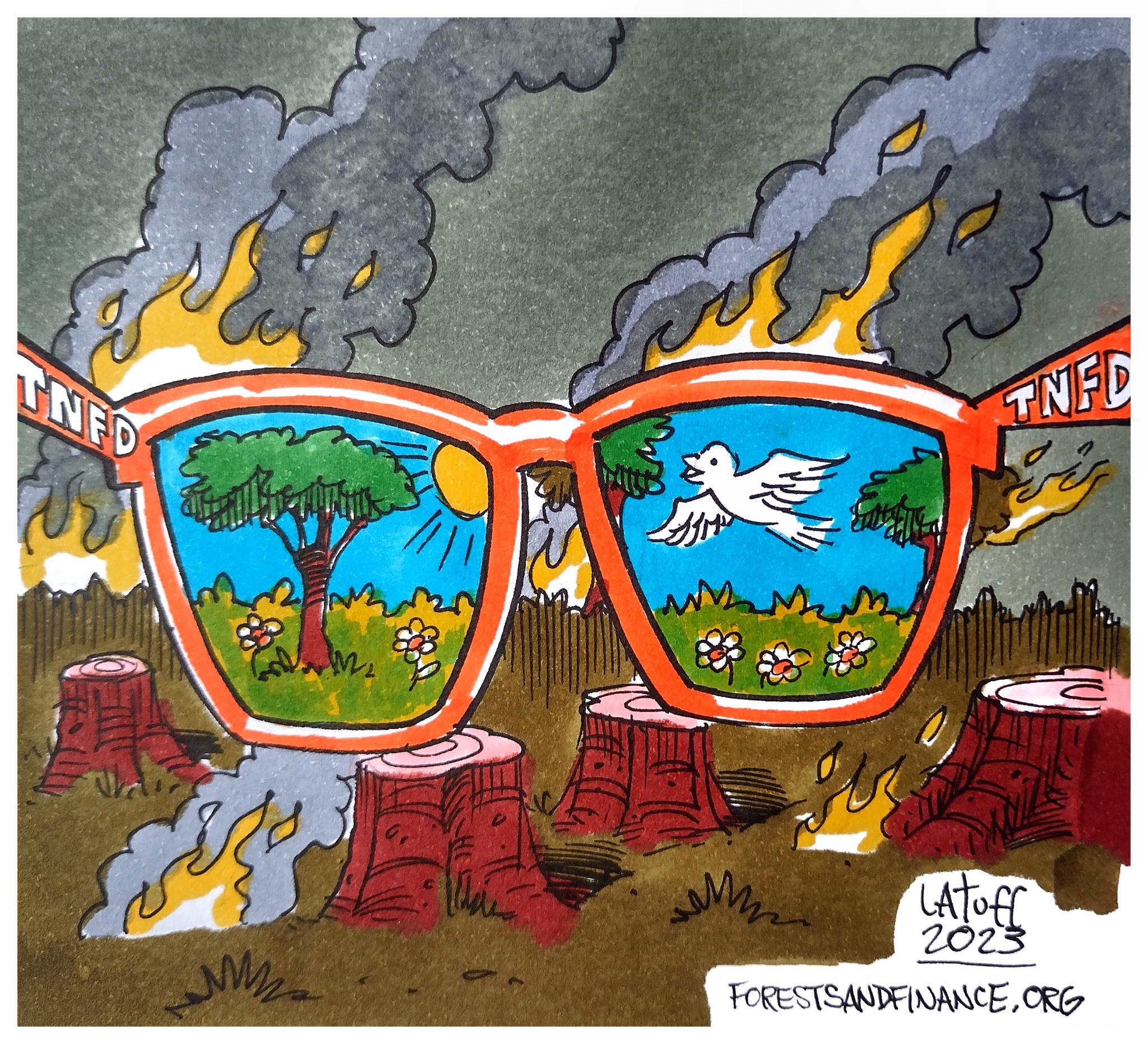
RAN has issued a preemptive response to the final TNFD version expected next week
New York, NY – The Taskforce on Nature Related Financial Disclosures (TNFD) is a corporate driven initiative headed by a taskforce of 40 senior executives from global corporations including several with highly problematic environmental records – such as BlackRock, Bank of America and HSBC. While the TNFD is led by business, it is endorsed by various actors on the international stage, including U.N. agencies and the G7. TNFD is developing a framework that outlines what information a company or financial institution should self-report regarding how its relationship with nature and biodiversity has, or will, impact its business.
The TNFD will be launching its final version on September 18th at the New York Stock Exchange during the busy New York City Climate Week. Rainforest Action Network has been tracking the progress of and engaging with the authors of the TNFD since its inception in 2021. Along with many other NGOs, RAN has raised serious concerns about its work.
In advance of the TNFD release on September 18th, Shona Hawkes, with Rainforest Action Network, has issued the following statement in response to the fundamental flaws RAN is confident will be contained in the final version:
“Our experience of tracking the TNFD is that not only will it be ineffective, but that its framework will allow companies to write TNFD reports that actually amplify and legitimize corporate greenwashing and misinformation.
“Unfortunately, given what we’ve seen throughout the drafting process, we’re pretty confident of what we can expect in the final TNFD framework. Predictably, this taskforce, solely made up of global corporations, will put forward a framework that protects its own interests, and which will allow for rampant greenwashing. There are also concerns that this will encourage, and motivate, the commodification of nature.
“What this means is that the TNFD WON’T recommend:
- Companies disclose and list complaints they face about their biodiversity and human rights practices – or even complaints that their biodiversity reporting is misleading. TNFD may recommend companies report on if they have a grievance mechanism – but not what the actual grievances are.
- Reporting that allows local communities to know if a company is operating in, sourcing from or financing activities in their local area. Instead, it will recommend ‘biome’ or ‘ecosystem’ level location reporting, which can span countries.
- Companies report if they are lobbying against stronger laws that would see biodiversity harms become a genuine risk to businesses.
- That all companies report their actual impacts on biodiversity – instead it will let companies decide whether they think trashing nature is ‘material’ or not. Among other issues, this will contribute to data that is chaotic, non-standardised and non-comparable. Even where companies do report on impacts, there’s no standardized methodology or data verification.
- Forms of reporting that allow data to be scrutinized, public and independently verified. What we can expect is high-level aggregated figures which cannot be checked against on the ground realities.
“Since TNFD’s first draft was released, civil society organizations have provided pages and pages of concerns, evidence and case studies on the implications of these flaws and technical options to close the worst of its loopholes.
“On launch day, we can expect a lot of spin, big promises and fine speeches about the TNFD framework. But there is shockingly little evidence behind TNFD’s claims – as environmental defenders, academics, economists and scientists have raised.
“One question we have is – has the TNFD changed the behavior of the corporations on its own taskforce? Currently, BNP Paribas is facing legal action over its links to deforestation. Bank of America remains the fourth largest banker of fossil fuels. Dow and Bayer continue to wrack up fines for environmental violations and BlackRock has been kicked out of a UN Women partnership after mass outcry, given its own social and environmental record.
“The Kunming-Montreal Global Biodiversity Framework clearly outlines the interconnected nature of human rights and environmental outcomes – including on gender, on intergenerational equity and on Indigenous Peoples’ rights. Yet there has been no gender analysis of TNFD’s recommendations. There has been no effort to meaningfully seek, or act on, the advice of grassroots women or youth movements.
“We also know that Indigenous Peoples’ have outlined serious concerns about its approach to Indigenous Peoples’ rights. The whole TNFD approach appears to contravene the Escazu Agreement framework on public participation in environmental decision-making, UN standards and basic good governance. We are particularly concerned that some UN agencies, governments and others are pressing for the corporate-led TNFD framework to be adopted into law. While TNFD has now acknowledged that human rights exist – it in no way centered a rights-based approach in its framework.
“The Intergovernmental Panel on Biodiversity and Ecological Services has said that market-based approaches are a leading driver of the biodiversity crisis – and to affect change we need to value nature in its own right and having intrinsic value. We have been extremely critical of the TNFD model as a whole as an avenue to affect positive change.
“The bigger point is that nothing in TNFD questions the right of corporations to keep the profits they make off environmental or human rights abuses. This is the heart of the problem. Not only is this of profound concern for environmental defenders – it exacerbates the systemic risk to our economies from biodiversity loss. The current status quo of profits with impunity creates market conditions that actually disadvantage and punish the businesses that are truly embedded in their communities and do business in ways that let people and nature thrive.
“On launch day we can expect TNFD to say that it has been ‘influenced’ by the views of civil society organizations and Indigenous Peoples. What it won’t do is respond to the substantive points that have been raised again and again on issues like complaints reporting, on lobbying, on the need for unilateral reporting on impacts.
“Throughout this process, TNFD’s framework has been incredibly convoluted, confusing and vague.”
TNFD FAQ
Below are some FAQ based on TNFD’s approach and recommendations on what companies should report. Note, this only focuses on TNFD’s disclosure recommendations. Recommendations for how companies should assess biodiversity are about internal evaluation and not intended for a company to disclose.
Who sits on the TNFD?
The ultimate decision-making body of the TNFD is a taskforce of 40 corporations. These corporations can get advice from others, but they are the ultimate decision-makers. There are no scientists or environmental defenders on the taskforce. It doesn’t even include the breadth and diversity of the business community – such as smallholders, small business or unions. There is no objective criteria for members to join the TNFD taskforce and it includes many corporations with a harmful environmental or human rights record.
Hasn’t TNFD received extensive feedback?
TNFD states that it has received ‘over 3000 pieces of feedback’. However, only around 60 pieces of feedback are public on its website. By our estimate, up to 98% of TNFD ‘feedback’ was made in secret. TNFD has also created a series of ‘national consultation groups’ but never disclosed who is in these groups. Many CSOs have repeatedly pointed out serious concerns with the key avenue for consultation – the TNFD Forum – which was only open to groups who “consent to the TNFD Secretariat to use your institution’s name and brand identity on our website signaling your support for the TNFD”.
Hasn’t TNFD listened to Indigenous Peoples and CSOs?
TNFD has resourced over 200 company pilots designed to test and give feedback to its processes. Throughout it’s drafting, it hasn’t included a single ‘piloting’ program for testing its recommendations against real-world cases to see if its reports would change company behavior or not – or worse still, if they would be misleading or inaccurate. This is despite multiple warnings – including here and here. Throughout its process, TNFD has focused the vast majority of its resources, staff time and communications strategies on corporations. TNFD often refers to its dialogue with the International Indigenous Forum on Biodiversity but fails to note the concerns raised in the group’s submission on the draft framework. Further examples of concerns expressed by many CSOs and rights holders can be found here.
Isn’t TNFD ‘science-based’?
TNFD says it’s science-based but it hasn’t taken any steps to test its recommendations against real-world examples. Corporations saying that TNFD will help them do better – isn’t the same as independent analysis of whether it will or not. In fact, throughout the drafting process TNFD failed to include a single example of what a TNFD report would look like (it included case studies of how companies should approach reporting – but not an actual report). Some academics have classified TNFD as an example of corporate capture which does not adhere to the Kunming-Montreal Global Biodiversity Framework.
Isn’t TNFD backed by UN agencies?
The TNFD initiative was co-founded by two UN agencies – UNDP and UNEP-FI (as well as two NGOs WWF and Global Canopy). Neither UN agency has ever publicly responded to civil society organization concerns about TNFD, including that it contravenes UN principles, is not consistent with the Escazu Agreement or the advice of the 2022 Intergovernmental Panel on Biodiversity and Ecosystem Services values report which stresses the importance of diversity in decision-making and justice. Supporting corporations to write their own standards goes against the most basic principles of sound decision-making. (See also this document from May 2022).
Why does Rainforest Action Network care about a voluntary initiative?
TNFD efforts have distracted from real and meaningful solutions to the biodiversity crisis advocated for by those with the best objective track record on safeguarding nature – such as environmental defenders, Indigenous Peoples, Afro-descendant communities, peasants, women’s organizations, youth movements and other frontline environmental defenders. It has, instead, amplified and empowered the voices of global corporations – including several who refuse to adequately act on credible allegations that they are causing or contributing to biodiversity loss and human rights abuses. This has distracted attention away from frontline defender solutions – including many groups’ support for new laws that would hold financiers, or companies more broadly, accountable for environmental or human rights harms they cause.
Secondly, any biodiversity initiative that sidelines environmental defenders, scientists and groups on the frontlines of safeguarding biodiversity appears highly unlikely to succeed. Thirdly, throughout the TNFD process, UN agencies, governments, co-founders and others have tried to normalize the idea – or even directly advocated for – TNFD to be the template of future laws and regulations. This draws off an earlier similar model on climate-related reporting, the TCFD. It is extremely concerning that anyone is legitimizing the idea that new regulations should be based on rules decided on by global corporations themselves.
Where can I find more information?
The Forests and Finance coalition has a webpage on TNFD, which includes a Timeline and Resources section that collates a range of civil society and other statements, submissions and resources about TNFD. This includes a series of Open Letters signed by dozens of organizations and networks. This includes a May 2023 letter signed by 62 organizations and networks – whose members include over 370 organizations in 85 countries, as well as three Goldman Environmental prize winners. It also includes press statements issued throughout the COP 15 2022 talks.
This blog was initially posted by RAN.

